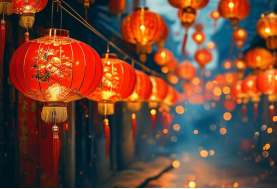
On December 4, 2024, “Spring Festival, social practices of the Chinese people in celebration of the traditional New Year” was added to the Representative List of the Intangible Cultural Heritage of Humanity by UNESCO.
Chinese New Year, also known as the Spring Festival, is the most important traditional festival in China. It begins on the first day of the lunar calendar, meaning the date changes every year but usually falls between January 21st and February 20th.
One week before the Spring Festival is xiaonian (Little New Year), or the Festival of the Kitchen God. People celebrate by making offerings to the Kitchen God, cleaning their homes, taking down old decorations like couplets and paper-cuts, and putting up new ones. They also take baths and haircuts, and do final shopping for the coming new year.
Chinese New Year’s Eve (chuxi) has special meaning. No matter where they are, people try to return home and celebrate with their families. The reunion dinner, which is the most important meal of the year, brings families together around round tables. They enjoy traditional dishes like dumplings, tangyuan (sweet glutinous rice balls), niangao (New Year cake), spring rolls, and hot pot. After dinner, families watch the CCTV Spring Festival Gala and stay awake until midnight to welcome the new year.
On the first day of Chinese New Year, people visit relatives and friends, exchanging blessings like “Happy New Year!”. Elders give children red envelopes (hongbao) with lucky money inside. Fireworks light up the sky, and lion and dragon dance performances fill the streets with the rhythm of drums.
Though people celebrate in different ways, the festival always carries the same wishes for happiness and good fortune in the new year.
原创编写 版权所有 侵权必究! 每日更新 个性化阅读 英语飙升!
1.1.The Spring Festival’s date is decided by ______.
A the normal calendar
B the sun’s position
C the moon calendar
D the government
解析:选C。细节理解题。根据第二段“on the first day of the lunar calendar”可知,春节日期是根据农历设定的。故选C。
2.2. Which is NOT done during xiaonian?
A Cleaning houses.
B Praying to Kitchen God.
C Lighting fireworks.
D Putting new decorations.
解析:选C。细节理解题。根据第三段可知,小年的活动包括祭灶神、大扫除、更换旧装饰(对联、窗花)、沐浴理发、备年货,但未提及放烟花。第五段提到大年初一才放烟花。故选C。
3.3. The big family dinner on chuxi mainly shows ______.
A different foods
B family love
C good harvest
D making money
解析:选B。推理判断题。根据第四段的“No matter where they are, people try to return home and celebrate with their families.”可知团圆饭(big family dinner)的重点是全家团聚,体现亲情。故选B。
4.4. Lion dances are meant to ______.
A show kung fu skills
B drive away bad luck
C make tourists happy
D help sell things
解析:选B。推理判断题。根据最一段的“people visit friends and relatives, wishing each other good luck with lucky words”“it’s all about wishing everyone happiness and good fortune for the coming year”可知,春节活动都带着“幸福吉祥”的愿望,可推知,舞狮是为了赶走坏运气。故选B。
5.5. This text is mostly about Spring Festival’s ______.
A past changes
B different local ways
C money matters
D cultural meanings
解析:选D。推理判断题。全文讲了春节的各种习俗(吃年夜饭、拜年等),都是在说明它的文化意义。故选D。
